Being a Flexible Thinker
Transcript
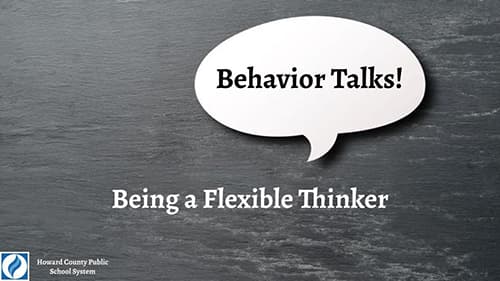
Title
This Behavior Talks Module is about Being a Flexible Thinker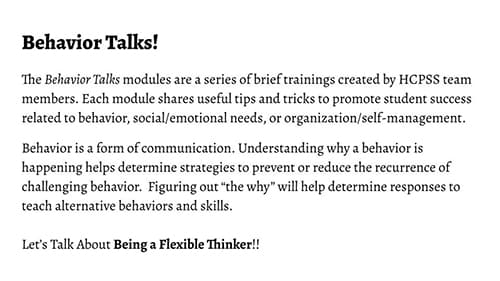
About Behavior Talks
The Behavior Talks modules are a series of brief trainings created by HCPSS team members.
Each module shares useful tips and tricks to promote student success related to behavior, social/emotional needs, or organization/self-management.
Behavior is a form of communication.
Understanding why a behavior is happening helps determine strategies to prevent or reduce the recurrence of challenging behavior.
Figuring out “the why” will help determine responses to teach alternative behaviors and skills.
Let’s Talk About Being a Flexible Thinker!
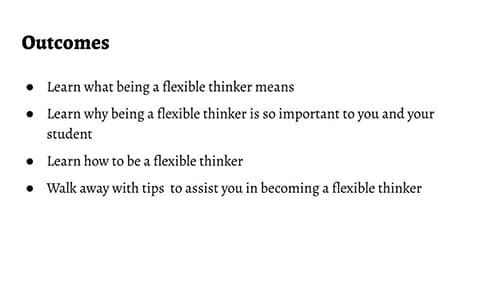
Objective
By the end of this module, we are hoping that you will have learned more about what it means to be a flexible thinker, why being a flexible thinker is so important for both students and adults, and how including flexible thinking practices within home routines can improve overall academic and behavioral outcomes for students.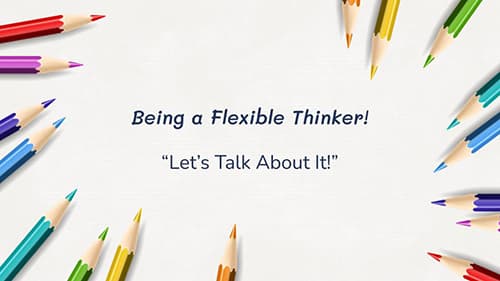
Here we go, lets talk about Being a Flexible Thinker!
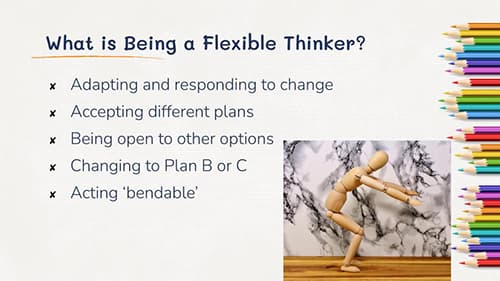
What is Being a Flexible Thinker?
According to Michelle Garcia Winner, respected Speech Language Pathologist and an expert in the area of flexible thinking, the idea of being a flexible thinker is the ability to consider different options and to adapt accordingly across places and people. For example, suppose you plan an outdoor graduation party in your beautiful yard and there is an unexpected thunderstorm. You can’t cancel the party, so you need to adapt and move the party inside. Here’s a virtual learning example that we can all relate to: It’s time to help your student sign into their class on google meet and you realize you have the wrong code. A flexible response would be to look at the schedule again and double check the code. Maybe you’ve discovered that the time was actually incorrect! In this situation, you may have to re-arrange your schedule. With both of these scenarios, an inflexible response may have been to panic or get frustrated. Being able to recognize our need to be flexible with changes out of our control can ease stress and frustration for both you and your student.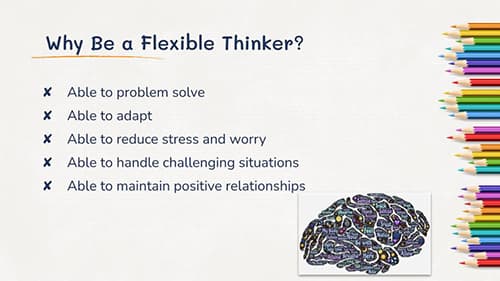
Why is it important to Be Flexible?
Think about a time when you were following directions to go somewhere you have never been and you come to a road closure. You needed to be a flexible thinker to change roads without getting upset. How about when your student is attending a virtual class and the internet goes out? Being a flexible thinker will allow you to handle a challenging situation by choosing simple solutions rather than getting stressed or worried. Calmly responding to unexpected changes will set a great example for your student on how to be a flexible thinker. Being a flexible thinker also helps maintain positive relationships by demonstrating the ability to respond calmly and see situations from others’ perspectives.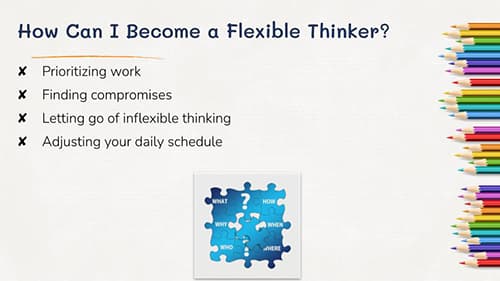
You may be curious about how you can enhance your flexible thinking skills as it applies to things you do every day.
Let’s talk about some ways you can adapt to the demands of changing situations and shift your thinking while still remaining consistent in your values.
First, it’s important to prioritize the work that needs to be done. It can be very overwhelming when you look at your student’s schedule and see how it may overlap with your own schedule. We know how much students can benefit from a consistent routine, so it’s important to set up a daily schedule with your student. Be realistic with your time and discuss how to prioritize your day. While prioritizing, you may struggle to balance what you and your student believe are the most important tasks to complete. These may be the same or they may be different from the teacher’s guidelines. Although it’s sometimes easier said than done, using flexible thinking can help you modify expectations and be ok with change.
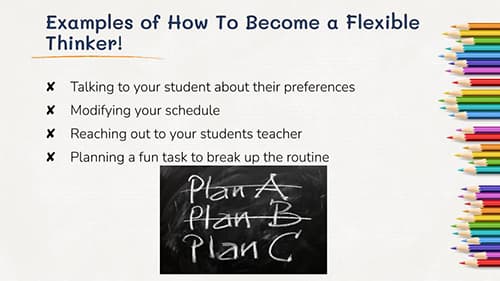
One great idea is to ask your student what works best for them! Try to remember that things like a work location may depend on the type of activity, not all work needs to be done sitting at a desk or table! You can also modify a lot of things in your students schedule. It is perfectly fine to change up the work order, work week, or time of work! Try to plan a fun task in between doing a difficult task. These tasks can be done independently or together! A key skill in becoming a flexible adult is to have the ability to recognize that it is ok if you’re having an unproductive day or a moment to pack up the books, call it a day, and start fresh at a later time.
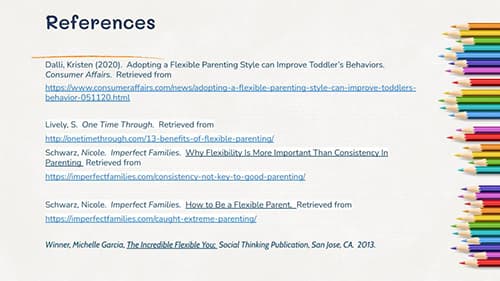
References
Dalli, Kristen (2020). Adopting a Flexible Parenting Style can Improve Toddler’s Behaviors. Consumer Affairs. Retrieved from https://www.consumeraffairs.com/news/adopting-a-flexible-parenting-style-can-improve-toddlers-behavior-051120.html
Lively, S. One Time Through. Retrieved from http://onetimethrough.com/13-benefits-of-flexible-parenting/
Schwarz, Nicole. Imperfect Families. Why Flexibility Is More Important Than Consistency In Parenting. Retrieved from https://imperfectfamilies.com/consistency-not-key-to-good-parenting/
Schwarz, Nicole. Imperfect Families. How to Be a Flexible Parent. Retrieved from https://imperfectfamilies.com/caught-extreme-parenting/
Winner, Michelle Garcia, The Incredible Flexible You; Social Thinking Publication, San Jose, CA. 2013.
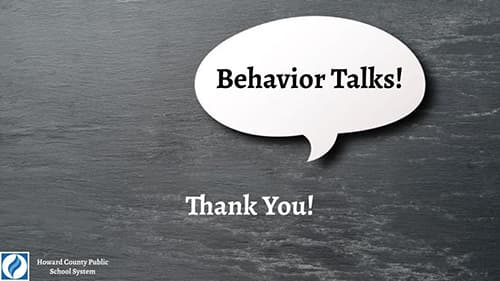
Thank You
Thank you for watching! We hope that you found this video helpful.
For additional resources please visit see the Behavior Talks additional resources page.